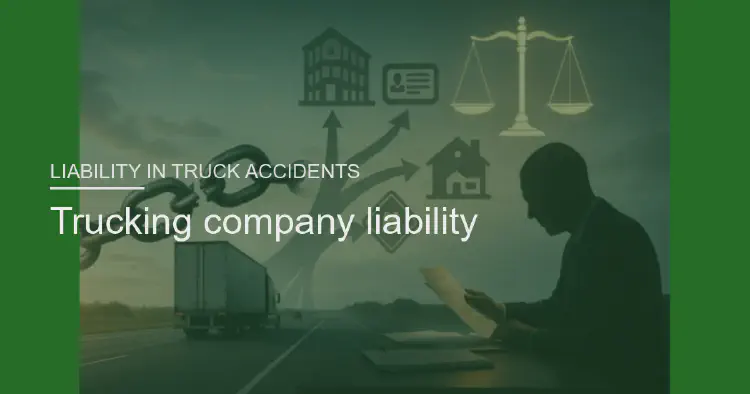Trucking company liability
While truck drivers are often the immediate cause of accidents, trucking companies themselves can also be held legally responsible. Their policies, oversight, and compliance with safety regulations play a central role in accident prevention.
- Truck Accident Law Team
- 2 min read
Article 2 of 6 in Liability in Truck Accidents/

Trucking Company Liability in Accidents
Legal Theories of Liability
-
Vicarious Liability (Respondeat Superior)
- Companies are liable for negligent acts of employees committed within the scope of employment.
- Example: If a company driver causes a crash while making a delivery, the company may share liability.
-
Negligent Hiring, Training, or Supervision
- Companies may be liable if they:
- Hired drivers without proper CDL or safety records.
- Failed to conduct drug/alcohol testing.
- Did not provide adequate safety training.
- Companies may be liable if they:
-
Negligent Maintenance
- Failure to maintain vehicles in compliance with FMCSA standards can make companies directly liable.
- Examples: Ignoring brake issues, skipping inspections, or falsifying maintenance logs.
-
Hours of Service (HOS) Violations
- Pressuring drivers to exceed legal driving hours or falsify logbooks.
- Dispatching schedules that make compliance impossible.
-
Improper Loading Practices
- If the company or its agents fail to secure cargo correctly, liability extends to the company.
Evidence in Litigation
- Employment and training records.
- Driver qualification files (DQFs) maintained under FMCSA rules.
- Maintenance and inspection logs.
- Internal communications showing pressure to meet unrealistic deadlines.
Consequences for Trucking Companies
- Civil Liability: Payment of compensatory and sometimes punitive damages.
- Regulatory Penalties: Fines, suspension of operating authority, or company shutdown by FMCSA.
- Reputation Damage: Loss of contracts and future business.
Why Company Liability Matters
- Trucking companies usually carry multi-million-dollar insurance policies, making them the primary target in accident litigation.
- Proving company negligence ensures victims have access to full compensation beyond what an individual driver can provide.
Summary: Trucking companies are not just employers—they are accountable entities required to maintain safe operations. When they cut corners on hiring, training, maintenance, or scheduling, they may bear significant liability in truck accident cases.
You might also like:
- Tags:
- Trucking Companies
- Hours Service
- Punitive Damages
- Trucking Company
- Accident Litigation
- Maintenance Logs
- Drug Alcohol
- Service Hos
- Alcohol Testing
- Fmcsa Rules
- Inspection Logs
- Maintenance Inspection
- Negligent Hiring
- Driving Hours
- Evidence Litigation
- Liability Truck
- Hos Violations
- Insurance Policies
- Improper Loading
- Hiring Training
- Vicarious Liability
- Legal Theories
- Companies Liable
- Training Supervision
- Negligent Maintenance
- Compliance Fmcsa
- Records Driver
- Million Dollar
- Multi Million
- Company Liability
- Scope Employment
- Hours Service Hos
- Drug Alcohol Testing
- Maintenance Inspection Logs
- Multi Million Dollar
- Hiring Training Supervision
- Trucking Company Liability
- Negligent Hiring Training
- Meet Unrealistic Deadlines
- Liability Vicarious Liability
- Employment Training Records
- Pressuring Drivers Exceed
- Falsifying Maintenance Logs
- Scope Employment Example
- Service Hos Violations
- Liability Truck Accident